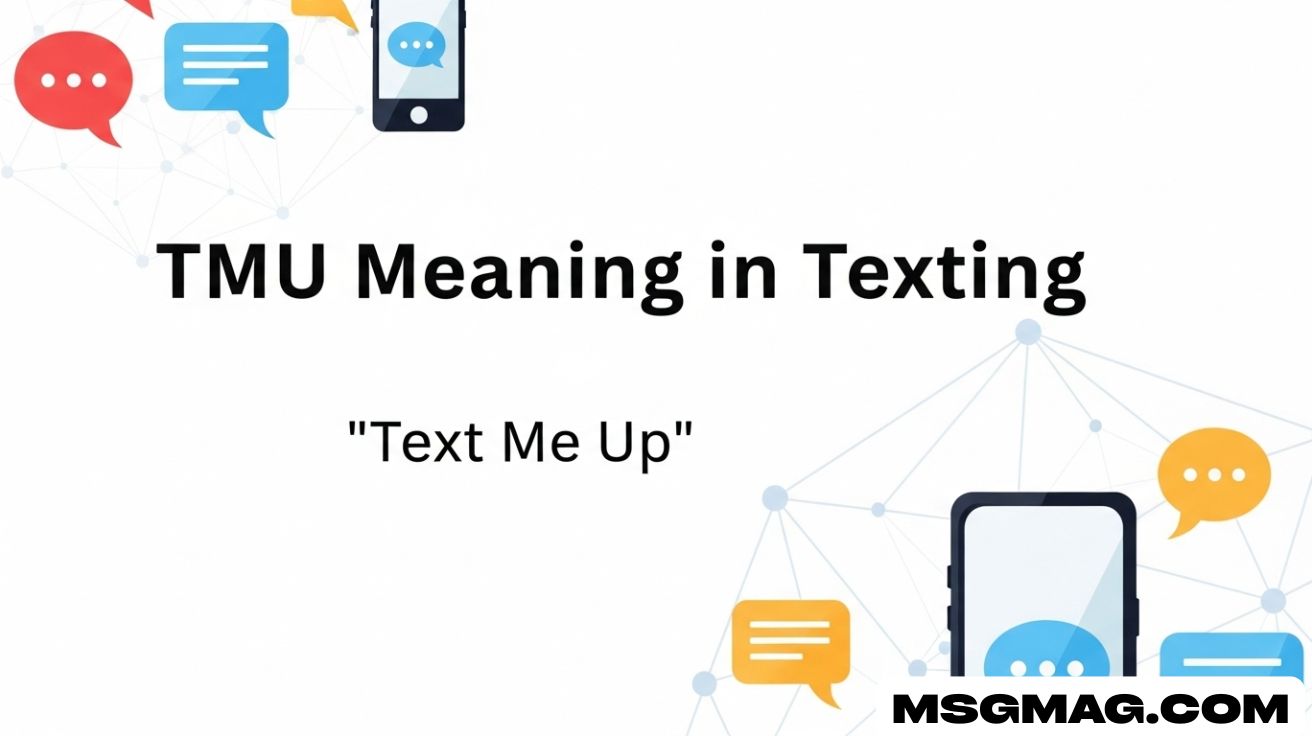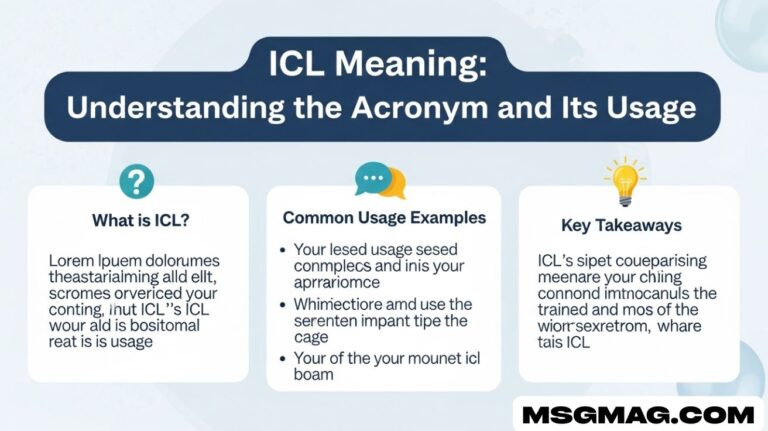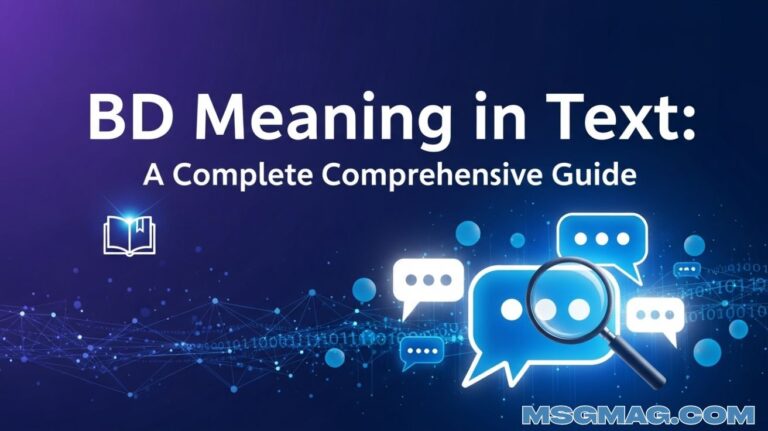TMU Meaning in Texting: What It Really Stands For
TMU Meaning in Texting is a popular abbreviation used in casual chats. It usually stands for “Tell Me You”. People use it to ask for information or confirmation.
Have you ever seen TMU in a message and wondered what it means? Many people get confused when they see it. Knowing the meaning helps you reply correctly.
TMU is mostly used in texting and social media. It can also have other meanings in work or gaming chats. Understanding TMU keeps your conversations clear and fun.
Definitions & Meaning
The most common TMU full form in chat is “Tell Me You.” This usage is informal and often acts as a prompt for someone to share information, feelings, or confirmations. For example, when a friend texts, “TMU coming to the party tonight?” they are asking for a direct response or confirmation. In this sense, TMU used in conversation is a simple and friendly way to encourage honesty and openness.
Apart from this primary meaning, TMU acronym usage can vary based on context. Other lesser-known interpretations include “Tell Me Usually,” which is sometimes used to inquire about someone’s habits, “Too Much Update,” commonly seen in professional or gaming chats indicating an overload of information, and “Team Management Unit,” used in workplace communications. Despite these variations, most casual users in the U.S. understand TMU in texting definition as a conversational prompt.
Here’s a small table summarizing the main meanings:
| TMU Full Form | Context | Example Usage |
| Tell Me You | Casual texting | “TMU finished your homework?” |
| Tell Me Usually | Informal inquiry | “TMU your morning routine?” |
| Too Much Update | Professional/gaming | “This TMU is overwhelming!” |
| Team Management Unit | Corporate | “Send the report to TMU by noon.” |
Using TMU meaning in text correctly depends on reading the context and knowing whether the conversation is casual, professional, or playful.
Origins & History
The rise of modern texting abbreviations like TMU is deeply connected to the evolution of digital communication. In the 1990s, early SMS and instant messaging platforms encouraged brevity due to character limits. Users naturally began creating acronyms to communicate quickly, giving birth to a wide variety of trending text slang and popular chat abbreviations.
TMU in slang emerged organically in online chat rooms and social media circles. Unlike more universal acronyms like LOL or BRB, TMU has remained niche, mainly used by younger audiences in specific communities. Its origin is not tied to a single person or platform; instead, it represents the digital language evolution and online communication trends where users innovate new short forms. This highlights how how slang evolves online, adapting to new platforms like TikTok, Instagram, and Snapchat.
Over the years, TMU has also been shared in small forums, group chats, and fan communities, showing that TMU context meaning can shift depending on the group or platform using it. Its informal nature makes it versatile and reflective of casual U.S. texting culture in 2025.
Usage in Different Contexts
TMU meaning on TikTok and social media platforms has grown as content creators and users look for fun ways to interact with followers. On Instagram captions, TMU is often a challenge prompt or invitation to share opinions. For example, an influencer might post, “TMU your favorite travel destination!” to encourage engagement. Here, meaning of TMU on social media is playful, interactive, and designed for community involvement.
In everyday texting, TMU used in conversation is a casual way to check in, ask for confirmation, or simply start a discussion. Friends often text, “TMU coming over later?” or “TMU done with the assignment?” These instances show how to use TMU in texting naturally without confusion.
In professional or team contexts, TMU abbreviation meaning may shift to “Team Management Unit” or refer to project updates, especially in startup cultures or technical teams. Though less common, this demonstrates that TMU in chat is context-sensitive. Understanding the conversation tone helps avoid misinterpretation.
Here is an example of TMU in different contexts:
| Context | TMU Usage | Example |
| Social Media | Prompt for engagement | “TMU your favorite movie quote!” |
| Casual Texting | Ask for confirmation | “TMU joining the party tonight?” |
| Professional | Department reference | “TMU requires your report by 3 PM” |
| Fan Communities | Part of jokes/slang | “TMU this season’s top character?” |
Common Misunderstandings & Clarifications
Many people confuse TMU vs TMI because the letters are similar. While TMI warns that someone is oversharing, TMU requests information. Others assume it is a typo or misread it as “TMZ” or “TMJ.” Misunderstanding TMU context meaning can lead to awkward exchanges or confusion in both social and professional settings.
It is important to remember that TMU in texting definition is flexible. In casual conversations, always consider the tone, platform, and relationship with the recipient. Asking for clarification when unsure avoids mistakes. For example, if a colleague texts, “TMU report updates,” clarifying whether it refers to a “Team Management Unit” or a general update is wise.
Alternatives & Synonyms
While TMU acronym usage is popular, there are several alternatives that can be used in casual texting language. For instance, “Tell me” is a straightforward replacement, while “What’s up?” or “What’s going on?” are casual conversation starters. Other options include HMU (Hit Me Up) for initiating contact, Fill me in for updates, and LMK (Let Me Know) for requesting information. Each carries slightly different tones. TMU vs LMK shows that TMU is more conversational, while LMK is often more direct or professional.
When selecting the right alternative, consider the audience and platform. Social media captions, group chats, and private messages each call for different levels of informality. Using these alternatives effectively ensures that TMU meaning in text or related acronyms do not confuse the recipient.
Read Also : What Does IGH Mean in Gaming & Online Communities?
Understanding TMU Meaning in Text
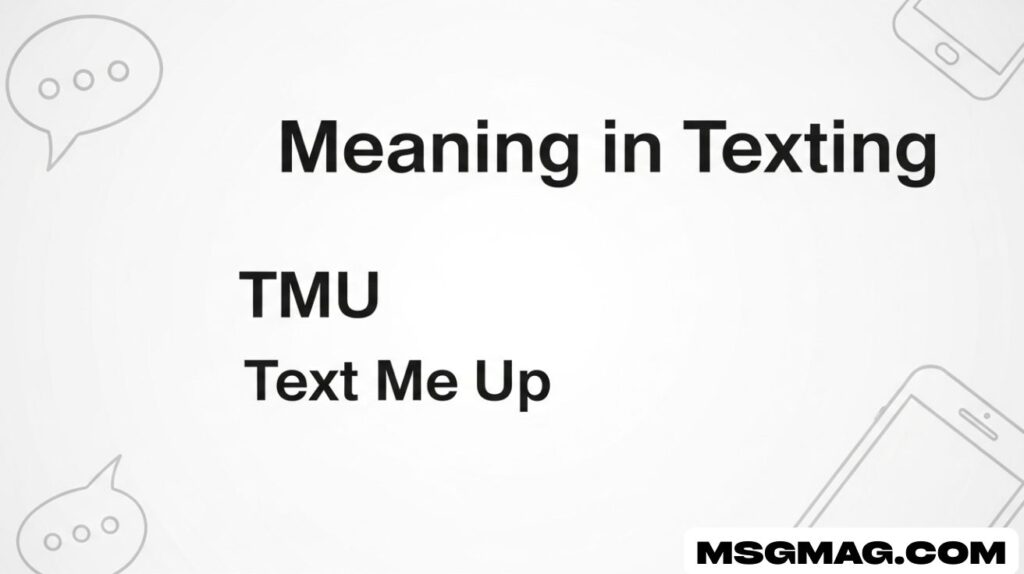
TMU is a modern texting abbreviation that often puzzles people. The most common interpretation is “Tell Me You,” used as a prompt to encourage someone to share information, feelings, or confirmations. In casual chats, knowing the TMU meaning in text helps you respond naturally and keeps conversations flowing smoothly without awkward pauses.
Beyond casual messaging, TMU in slang can have alternative meanings depending on the context. For instance, in professional chats, it might mean “Team Management Unit,” and in gaming or social media, it could indicate “Too Much Update.” Recognizing what TMU stands for ensures you never misinterpret a message, keeping your digital communication clear and effective.
The Origins & History of TMU
The abbreviation TMU emerged from the need for speed in texting, especially in early instant messaging and SMS platforms. In the 1990s, texting acronyms 2025 like TMU began evolving to save time and characters, reflecting the fast pace of online communication. Its origin is part of the larger digital language evolution.
Unlike major acronyms such as LOL, TMU remained niche, circulating in small online communities and chat rooms. Internet slang TMU represents how people create shorthand forms to express ideas quickly. Over time, TMU migrated to platforms like Instagram and TikTok, where modern texting abbreviations thrive in casual, social contexts.
How TMU is Used in Social Media
On platforms like Instagram and TikTok, TMU serves as an engaging prompt. Users post phrases like “TMU your favorite travel spot!” to invite followers to share content. This demonstrates the meaning of TMU on social media and shows how slang can encourage interaction in creative ways.
TMU in Instagram captions and TikTok comments highlights the playful nature of online communities. By understanding TMU in texting definition, social media users can decode posts quickly and participate in trends. This flexible usage is a perfect example of how slang evolves online in the 2025 social media landscape.
TMU in Everyday Texting Conversations
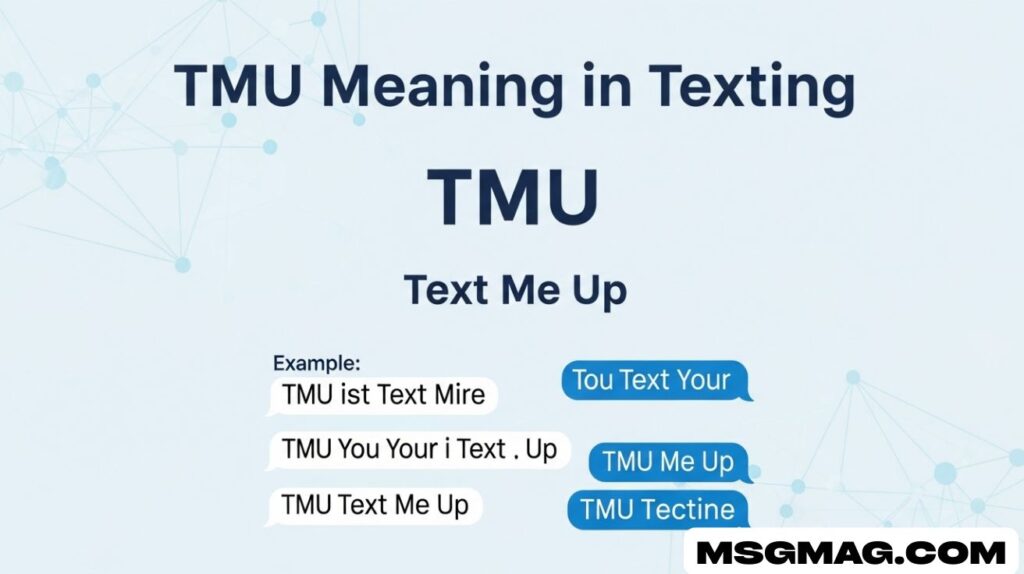
In casual texting, TMU often acts as a question or check-in. For example, friends might ask, “TMU coming to the party tonight?” This informal use illustrates TMU used in conversation and keeps discussions friendly and interactive. It also reflects trending text slang among younger audiences.
Knowing how to use TMU in texting correctly prevents misunderstandings. Unlike confusing acronyms such as TMI, TMU requests information or confirmation rather than signaling oversharing. By understanding TMU context meaning, users can respond appropriately and maintain smooth digital communication across platforms.
Common Misunderstandings of TMU
TMU is sometimes confused with TMI or other acronyms, which can lead to misinterpretation. Many users mistake TMU for a typo or misread it as TMJ or TMZ. Understanding TMU meaning in text ensures you decode messages correctly without errors.
Misunderstandings often occur in professional chats, where TMU could refer to a “Team Management Unit.” Context is key, as TMU in chat can change meaning depending on the conversation. Recognizing TMU acronym usage helps avoid miscommunication in both casual and formal messaging environments.
Alternatives and Synonyms to TMU
If TMU feels unclear, there are several alternatives to convey the same idea. Phrases like “Tell me,” “What’s up?” or “Fill me in” can replace TMU in casual chats. Acronyms like HMU (Hit Me Up) or LMK (Let Me Know) are also commonly used. Understanding TMU vs LMK helps users choose the right tone.
Each alternative varies in style and formality. While TMU is friendly and casual, LMK is direct, and HMU is often playful. Knowing these options enhances TMU meaning in text, ensuring smooth communication and adapting to slang terms in social media and digital messaging trends.
The Future of TMU in Digital Communication
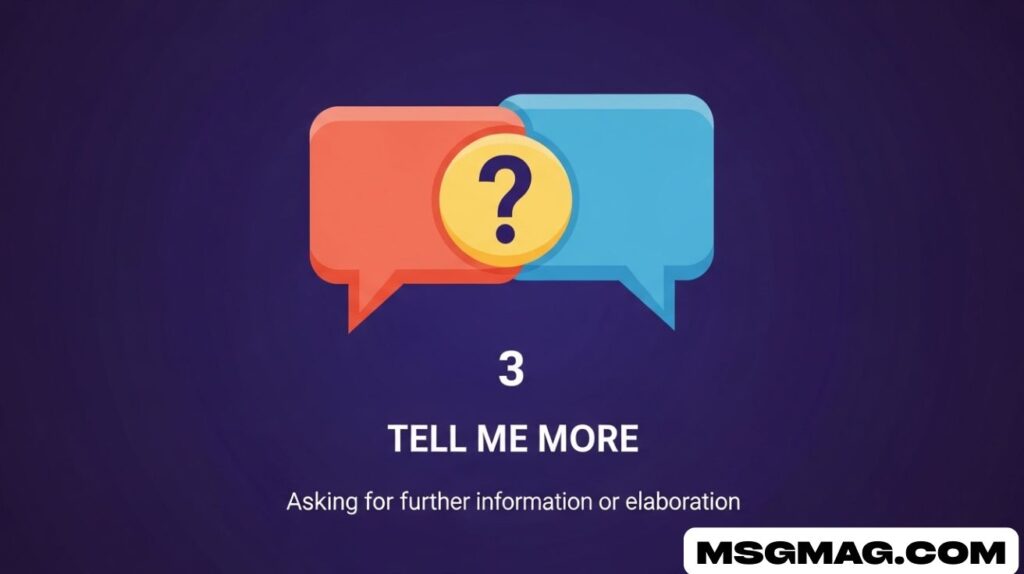
As online communication trends evolve, TMU is likely to continue its presence in casual texting and social media interactions. Acronyms like TMU reflect how slang evolves online and the growing need for concise, fun digital expressions. Its flexibility makes it relevant in both personal and professional messaging.
Future uses may include creative social media campaigns or niche communities, emphasizing TMU in Instagram captions and TikTok posts. Keeping up with these modern texting abbreviations allows users to stay engaged, understand TMU in slang, and participate in the evolving landscape of digital language evolution.
Frequently Asked Questions
What does TMU mean?
TMU usually stands for “Tell Me You” and is used to prompt someone to share information or confirm something in casual texting.
What does TM mean in a text message?
TM commonly means “Too Much” or “Team Member” depending on context, often used to express excess or refer to someone in a group.
What does TMU mean in Snapchat?
On Snapchat, TMU is typically used as “Tell Me You”, encouraging friends to respond or share something about themselves.
What does TMO mean on Instagram?
TMO usually stands for “Talk More Often” or “Text Me Okay” in informal Instagram comments and captions.
Conclusion
Understanding TMU meaning in text is a valuable skill in the evolving landscape of digital communication. While TMU most commonly stands for “Tell Me You,” it can also vary depending on context, from playful social media prompts to professional references like “Team Management Unit.” Recognizing TMU used in conversation ensures smooth communication and reduces misunderstandings.
As internet slang TMU continues to grow in popularity on TikTok, Instagram, and casual texting, knowing how to use TMU in texting keeps you up to date with trending text slang and online communication trends. The acronym represents the flexibility of modern texting abbreviations, showing how slang terms in social media evolve and adapt to different audiences. Whether you are texting friends, collaborating at work, or engaging with followers online, understanding TMU in chat helps you stay in the loop and communicate effectively in 2025.

